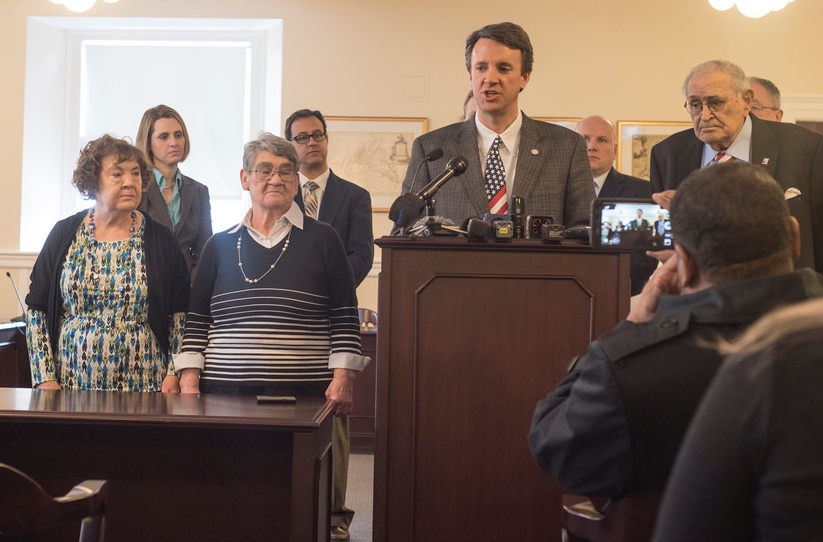Compensation OK’d for forced sterilization victims
The surviving victims of Virginia’s forced sterilization program, which from the 1920s through the 1970s sterilized people deemed by state officials as mentally or physically unfit to have children, would each receive $25,000 in compensation under actions taken this week by the General Assembly.

By Craig Zirpolo
The surviving victims of Virginia’s forced sterilization program, which from the 1920s through the 1970s sterilized people deemed by state officials as mentally or physically unfit to have children, would each receive $25,000 in compensation under the revised state budget approved this week by the General Assembly.
Legislators set aside the money–a total of $400,000–when they approved amendments to the 2014-16 state budget. The funds, which would be available July 1st, will be paid “to individuals who were involuntarily sterilized pursuant to the Virginia Eugenical Sterilization Act and who were living as of February 1, 2015,” according to the budget amendment. “The amendment provides for a reimbursement of $25,000 per individual.”
Virginia is the second state to compensate victims of forced sterilization. State legislators in North Carolina set aside $50,000 per victim as compensation in 2013.
Since then, several Virginia legislators have urged the General Assembly to follow suit. They included Republican Dels. Bob Marshall of Prince William County and Ben Cline of Amherst, as well as Democratic Del. Patrick Hope of Arlington. Supporters of the effort also included groups such as the Family Foundation of Virginia, the Christian Law Institute and the American Civil Liberties Union of Virginia.
Cline called Virginia’s forced sterilization program “a dark shadow on our commonwealth’s history.” From 1924 to 1979, more than 7,000 Virginians were sterilized without their consent. Most of the victims were people whom the state had deemed physically or mentally unfit.
“I can think of few greater injustices than a government physically altering human beings without their consent to deny them the right to give life and to have a family,” said Victoria Cobb, president of the Family Foundation. “It is long past time for our government to accept responsibility for its actions.”
The eugenic program in Virginia inspired similar legislation in 32 states during the 1920s and eventually the sterilization of over 65,000 Americans. Adolph Hitler based his racial purity efforts on Virginia’s program, Hope said. “I hope that at the end, we recognize Virginia’s role in this repugnant part of our state’s history,” Hope said. “Recognize that we’ve done something wrong, and we’re going to do something right today.”
Advocates have located 11 living victims of the program. Lawmakers included extra funding for others who may come forward later.
Lewis Reynolds, an 85-year-old electrician and Marine veteran from Lynchburg, was forcibly sterilized when he was 13 years old. The procedure was done after he suffered a head injury and doctors misdiagnosed him with epilepsy. The doctors did not notify Reynolds of the procedure. He found out years later when he tried to start a family and could not.
“I thank you all very much – more than you’ll ever know,” Reynolds said at a press conference Friday with lawmakers and advocates at the Capitol.
Virginia legislators passed the Virginia Eugenical Sterilization Act in 1924, the same year they approved the Racial Integrity Act barring interracial marriage.
Three years later, the U.S. Supreme Court upheld the sterilization program in Buck v. Bell. In the majority opinion, Supreme Court Justice Oliver Wendell Holmes Jr. famously said, “Three generations of imbeciles are enough.”
In 1980, the ACLU filed a class action lawsuit against Lynchburg Training School & Hospital, one of six sites then carrying out forced sterilizations in Virginia. The ACLU said the procedures violated victims’ constitutional rights.
“Politicians, like those who passed the forced sterilization program, should not have the right to decide whether an individual has a child,” said Aisha Huertas Michel, director of the Patricia M. Arnold Women’s Rights Project for the ACLU of Virginia. “The victims of forced sterilizations were stripped of this right without their knowledge or consent.”
The case was settled in 1985 when the state agreed to launch a media campaign to inform victims of their sterilization and provide counseling services. In 2002, then-Governor Mark Warner formally apologized for the eugenic program.
In 2013, the Virginia House of Delegates sought to include $25,000 for each victim in the state budget, but the Senate did not approve the measure. This year, no legislator objected to the fund.
“Although money does not restore the intentional harm perpetrated against these individuals by their own government, it does, however, provide a great level of healing and forgiveness,” said Mark Bold, executive director of the Christian Law Institute. “The commonwealth is finally telling the victims that they matter, their lives have value and they are equally important to us as a community.”
-
Recommend this
on Facebook -

Report an error
-

Subscribe to our
Weekly Digest




There are no reader comments. Add yours.